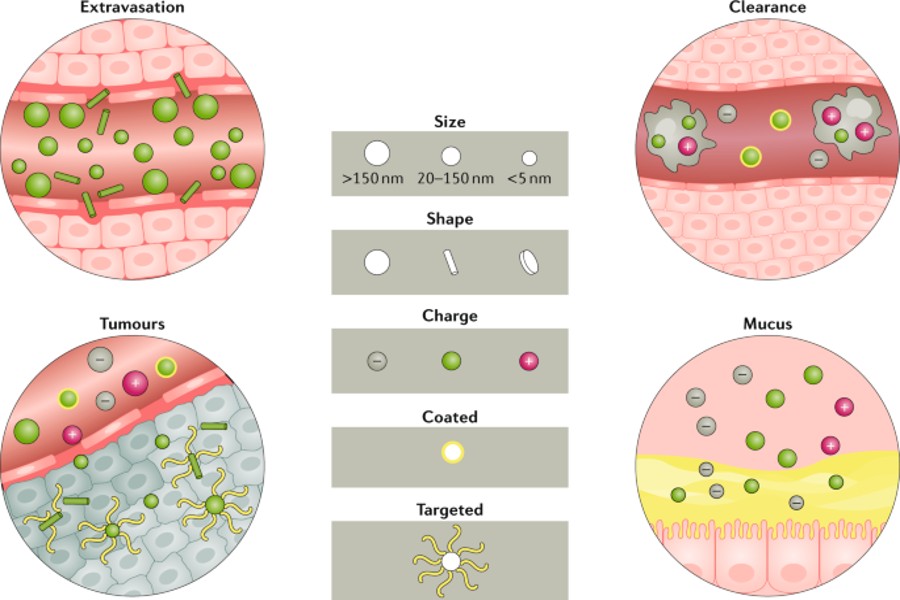Advancements in Cancer Treatment: Harnessing Nanoparticles for Precision Therapy
Cancer remains one of the most formidable challenges to human health, affecting millions of lives worldwide. The complexity of cancer lies not only in its ability to proliferate uncontrollably but also in its capacity to evade traditional treatments and develop resistance over time. In the pursuit of more effective therapies, researchers have turned to innovative approaches, including the utilization of nanoparticles (1-100 nm), to revolutionize cancer treatment. Nanoparticles offer unique advantages, such as targeted drug delivery, enhanced therapeutic efficacy, and reduced side effects, making them promising candidates for precision therapy against cancer.
Understanding Cancer: A Complex Disease
Cancer is a multifaceted disease characterized by the uncontrolled growth and spread of abnormal cells in the body. It can originate from various tissues and organs, leading to diverse forms of the disease, each with its unique challenges and treatment considerations. Traditional cancer treatments, such as surgery, chemotherapy, and radiation therapy, have been instrumental in combating the disease. However, these approaches often exhibit limitations, including non-specific targeting, systemic toxicity, and the development of drug resistance, highlighting the need for alternative strategies.
The Role of Nanoparticles in Cancer Therapy
Nanoparticles, particles with dimensions typically ranging from 1 to 100 nanometers, have emerged as promising tools for cancer therapy. Their small size grants them access to tumor sites through leaky vasculature, a phenomenon known as the enhanced permeability and retention (EPR) effect, enabling selective accumulation within the tumor microenvironment. Additionally, nanoparticles can be engineered to carry therapeutic payloads, including chemotherapeutic drugs, nucleic acids, and imaging agents, with precise control over release kinetics and targeting specificity.
Targeted Drug Delivery and Enhanced Therapeutic Efficacy
One of the key advantages of nanoparticle-based therapy is the ability to achieve targeted drug delivery to cancer cells while sparing healthy tissues. By functionalizing nanoparticles with targeting ligands, such as antibodies or peptides, researchers can direct therapeutic agents specifically to cancerous cells, minimizing off-target effects and maximizing drug concentration at the tumor site. This targeted approach not only enhances therapeutic efficacy but also reduces systemic toxicity, improving patient outcomes and quality of life.
Moreover, nanoparticles can encapsulate a wide range of therapeutic agents, including hydrophobic drugs that are poorly soluble in aqueous environments. This encapsulation protects the payload from degradation and premature clearance, prolonging its circulation time in the bloodstream and facilitating sustained release kinetics at the tumor site. As a result, nanoparticles can achieve higher intratumoral drug concentrations compared to conventional formulations, overcoming biological barriers and enhancing the therapeutic index of anticancer drugs.
Nanotechnology-Enabled Imaging and Diagnosis
In addition to therapeutic applications, nanoparticles play a crucial role in cancer imaging and diagnosis. Nanoparticle-based contrast agents, such as quantum dots and iron oxide nanoparticles, exhibit unique optical and magnetic properties that can be exploited for non-invasive imaging modalities, including magnetic resonance imaging (MRI), computed tomography (CT), and fluorescence imaging. These imaging probes enable early detection of tumors, precise localization of cancerous lesions, and real-time monitoring of therapeutic response, facilitating personalized treatment strategies and improving patient outcomes.
Overcoming Biological Barriers and Drug Resistance
Another challenge in cancer therapy is the development of drug resistance, whereby cancer cells acquire genetic mutations or adaptive mechanisms that render them insensitive to treatment. Nanoparticle-based strategies offer innovative solutions to overcome these barriers and circumvent drug resistance mechanisms. For instance, nanoparticles can be engineered to bypass efflux pumps, cellular barriers, and immunosuppressive mechanisms that contribute to drug resistance, ensuring effective delivery of therapeutic agents to cancer cells.
Furthermore, nanoparticles can be designed to target specific molecular pathways involved in drug resistance, such as anti-apoptotic proteins, drug efflux transporters, and DNA repair mechanisms. By modulating these pathways using nanotechnology-based approaches, researchers can sensitize cancer cells to conventional therapies and overcome resistance mechanisms, restoring the efficacy of existing drugs and improving patient outcomes.
Clinical Translation and Future Perspectives
The translation of nanoparticle-based therapies from bench to bedside represents a significant milestone in cancer research and clinical practice. Several nanoparticle formulations have progressed to clinical trials, demonstrating safety, efficacy, and feasibility in human subjects across a wide range of cancer types. Ongoing research efforts focus on optimizing nanoparticle design, improving biocompatibility, scalability, and manufacturability, and elucidating the mechanisms of nanoparticle-cell interactions in the tumor microenvironment.
Looking ahead, the integration of nanotechnology with other emerging fields, such as immunotherapy, gene editing, and regenerative medicine, holds immense promise for the development of next-generation cancer therapies. By leveraging interdisciplinary approaches and harnessing the power of nanotechnology, researchers aim to transform the landscape of cancer treatment, ushering in an era of precision medicine where therapies are tailored to the unique molecular and genetic profiles of individual patients.
In conclusion, nanoparticle-based therapy represents a paradigm shift in the field of cancer treatment, offering unprecedented opportunities for targeted drug delivery, enhanced therapeutic efficacy, and personalized medicine. As our understanding of cancer biology continues to evolve and technological advancements accelerate, the potential of nanotechnology to revolutionize cancer therapy remains vast and far-reaching. By capitalizing on the unique properties of nanoparticles and harnessing their therapeutic potential, researchers strive to overcome the challenges posed by cancer and improve outcomes for patients worldwide.
Source:

